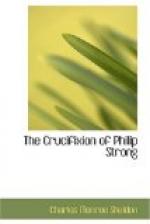Mr. Winter was silent. They had come out of the district and were walking along together toward the upper part of the city. The houses kept growing larger and better. Finally they came up to the avenue where the churches were situated—a broad, clean, well-paved street with magnificent elms and elegant houses on either side and the seven large, beautiful church-buildings with their spires pointing upward, almost all of them visible from where the two men stood. They paused there a moment. The contrast, the physical contrast was overwhelming to Philip, and to Mr. Winter, coming from the unusual sights of the lower town, it must have come with a new meaning.
A door in one of the houses near opened. A group of people passed in. The glimpse caught by the two men was a glimpse of bright, flower-decorated rooms, beautiful dresses, glittering jewels, and a table heaped with luxuries of food. It was the Paradise of Society, the display of its ease, its soft enjoyment of pretty things, its careless indifference to humanity’s pain in the lower town. The group of new-comers went in, a strain of music and the echo of a dancing laugh floated out into the street, and then the door closed.
The two men went on. Philip had his own reason for accompanying the other home, and Mr. Winter was secretly glad of his presence, for he was timid at night alone in Milton. He broke a long silence by saying:
“Mr. Strong, if you preach to the people to leave such pleasure as that we have just glanced at to view or suffer such things as are found in the tenements, you must expect opposition. I doubt if they will understand your meaning. I know they will not do any such thing. It is asking too much.”
“And yet the Lord Jesus Christ ’although He was rich, for our sakes became poor, that we, through His poverty, might be rich.’ Mr. Winter, what this town needs is that kind of Christianity—the kind that will give up the physical pleasures of life to show the love of Christ to perishing men. I believe it is just as true now as when Christ lived, that unless they are willing to renounce all that they have they cannot be his disciples.”
“Do you mean literally, Mr. Strong?” asked the rich man after a little.
“Yes, literally, sometimes. I believe the awful condition of things and souls we have witnessed to-night will not be any better until many, many of the professing Christians in this town and in Calvary Church are willing to leave, actually to leave their beautiful homes and spend the money they now spend in luxuries for the good of the weak and poor and sinful.”
“Do you think Christ would preach that if he was in Milton?”




